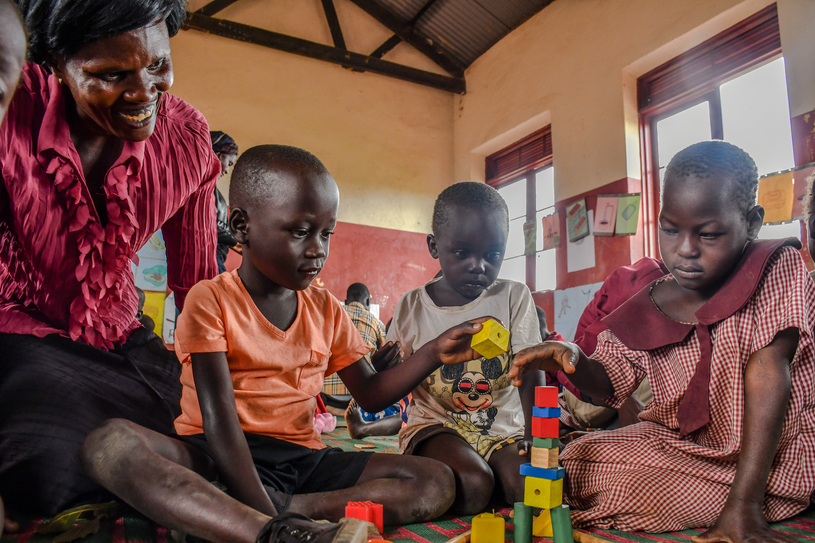Play ignites Children's learning in BidiBidi Refugee Settlement
Play is critical to children's learning.
Jan 25, 2023

Holy Dove Early Childhood Development (ECD) Centre in Bidibidi Refugee Settlement, Yumbe District is one of the centres hosting 406 children for early learning between the ages 3-12 years. Established in 2016 by Plan International Uganda, the centre is supporting children to Learn through Play, an active teaching and learning method that capitalizes on a child’s natural desire to engage in play. This approach is enjoyable, less stressful, and participatory, and improves children’s well-being and holistic learning.
Esther Waiya, Lead Caregiver says that before the project was introduced in the area, many children were not attending ECD because the centres were not available in the community.
“Many children are now well prepared for primary education. Even the parents now know the role of playing with their children is something that has paramount importance for holistic development of children and for wellbeing,” says Esther.
Learning made easy and fun through play
Study time is an exciting moment at Holy Dove ECD. Children learn through play. Some of the activities include measuring sand in old plastic bottles guided by their Caregivers who also participate in the measuring. Building castles using building blocks, enjoying their dolls made out of local materials, and taking roles in managing their classroom marketplace. Esther, their caregiver helps those who are not doing it well. Children will always look out for break time to engage in outdoor activities including skipping ropes, playing on swings and football among others.
According to Esther, children learn numeracy and literacy through play. “Learning through Play helps children to socialise, memorise what they are taught, build different life skills and enjoy lessons as part of the fun,” says Esther.

Learning through Play is enjoyable, less stressful, participatory and improves children's well-being and holistic learning.
Esher adds that 6 Caregivers at the centre have undergone professional training on the Learning through Play model supported by Plan International, as part of the PlayMatters project. “During the training, we learnt how to teach children through play, planning for play-based lessons, and psychosocial support of children under trauma among others, “says Esther.
Esther says that in addition, Plan International has renovated some classroom blocks, pays salaries for Caregivers, prints Information, Education and Communication (IEC) materials like t-shirts, and banners, buys classroom mats, crayons, writing slates for children, markers, chalk, paint, manila cards and children’s play materials like building blocks, among others.
The Caregivers collect old bottles, boxes, and sacks of old pieces of cloth and they use them to make play materials. Parents too bring materials like leaves, stones, sand, and banana fibres among others and help with the making of skipping ropes, fibre-balls, dolls, model cups, plates, model animals and birds among others. All these are made with the help of learners.
Beatrice Chandiru, Lead Caregiver at Peace ECD centre in the same settlement, with an enrolment of 500 boys and 402 girls, says since many of the children are refugees, the majority have challenges including psychosocial issues. “Playing at school rehabilitates them. It helps them to associate with others, but also to refresh their minds from past effects of the war experience in their home country,” says Beatrice.
Children learn numeracy and literacy through play, which helps them to socialize and memorize what they are taught.
Adnan Aguyo, Inspector of Schools, Yumbe District says that before PlayMatters was introduced in the district, there were many challenges hindering the quality of learning at home, school, and in the community.
He adds that challenges included crowded classrooms, inadequate teacher skills, limited access to essential teaching and learning resources and parental stress.
“Through play, children have grown stronger bonds with each other, their parents, caregivers, and the community at large. Children are also motivated to learn, stay, perform well in school and have better learning experiences,” says Adnan.
PlayMatters is dedicated to supporting teachers and caregivers in Yumbe District through Teacher Professional Development training, ongoing coaching and mentoring to the caregivers, teachers and the key actors in the centre.